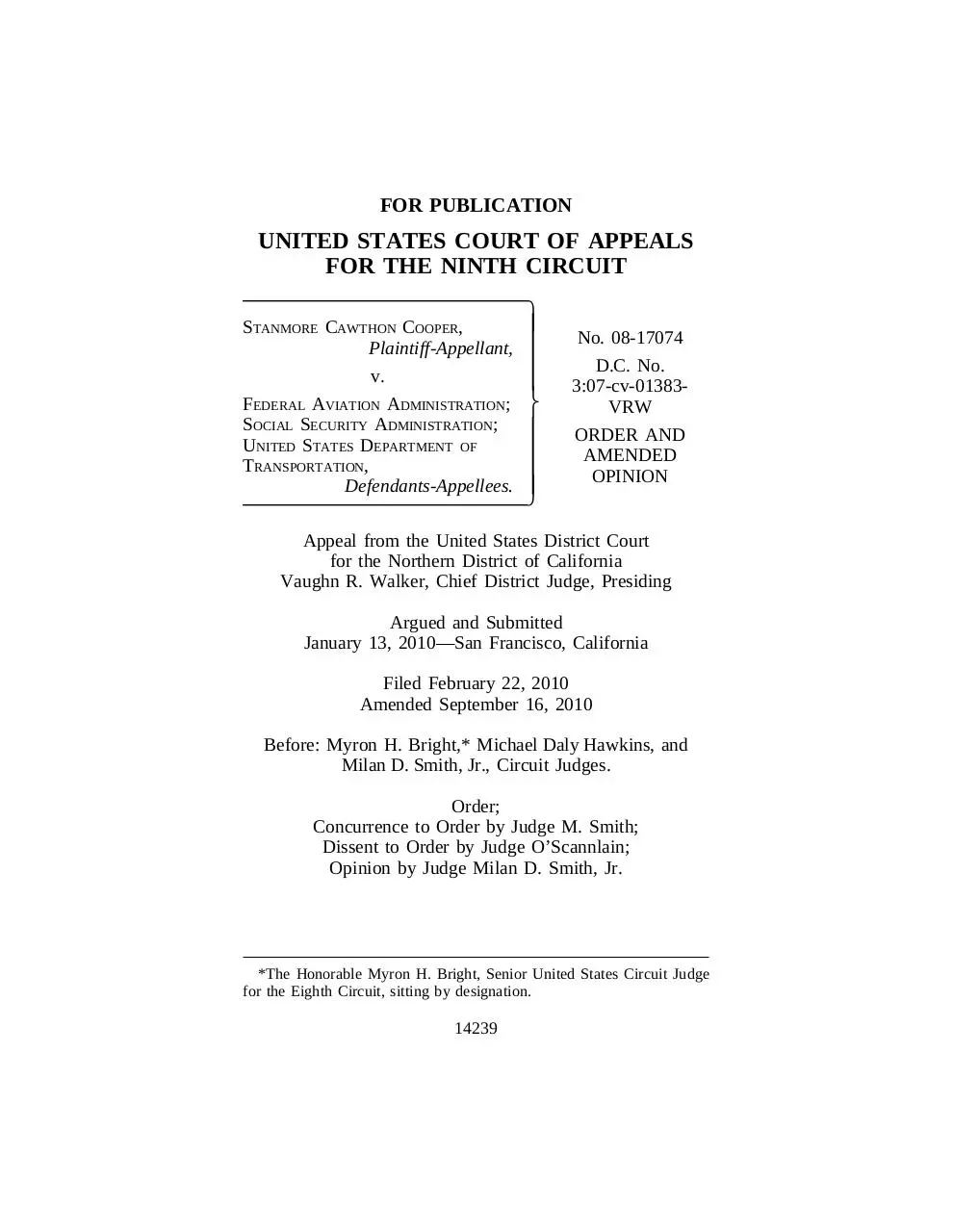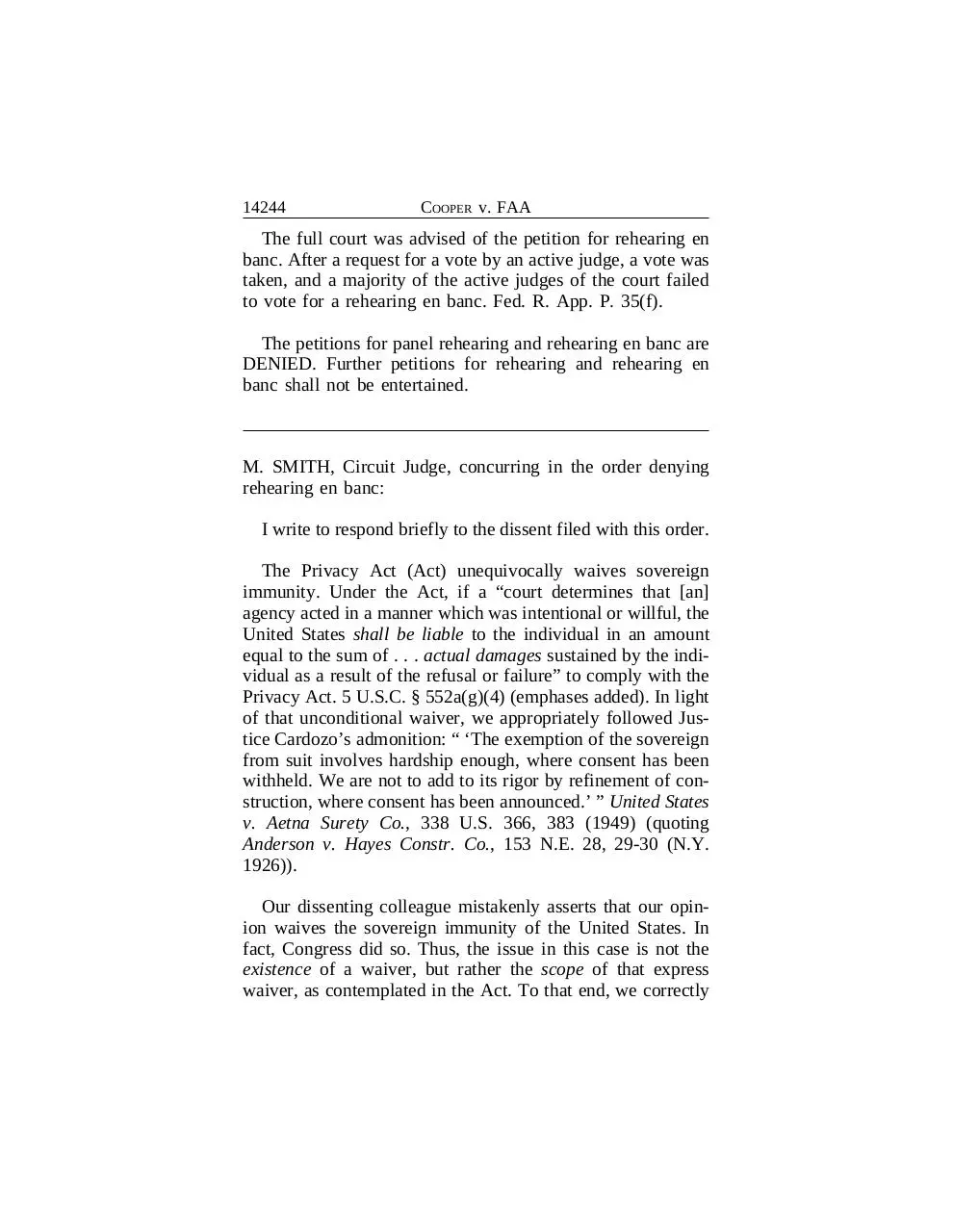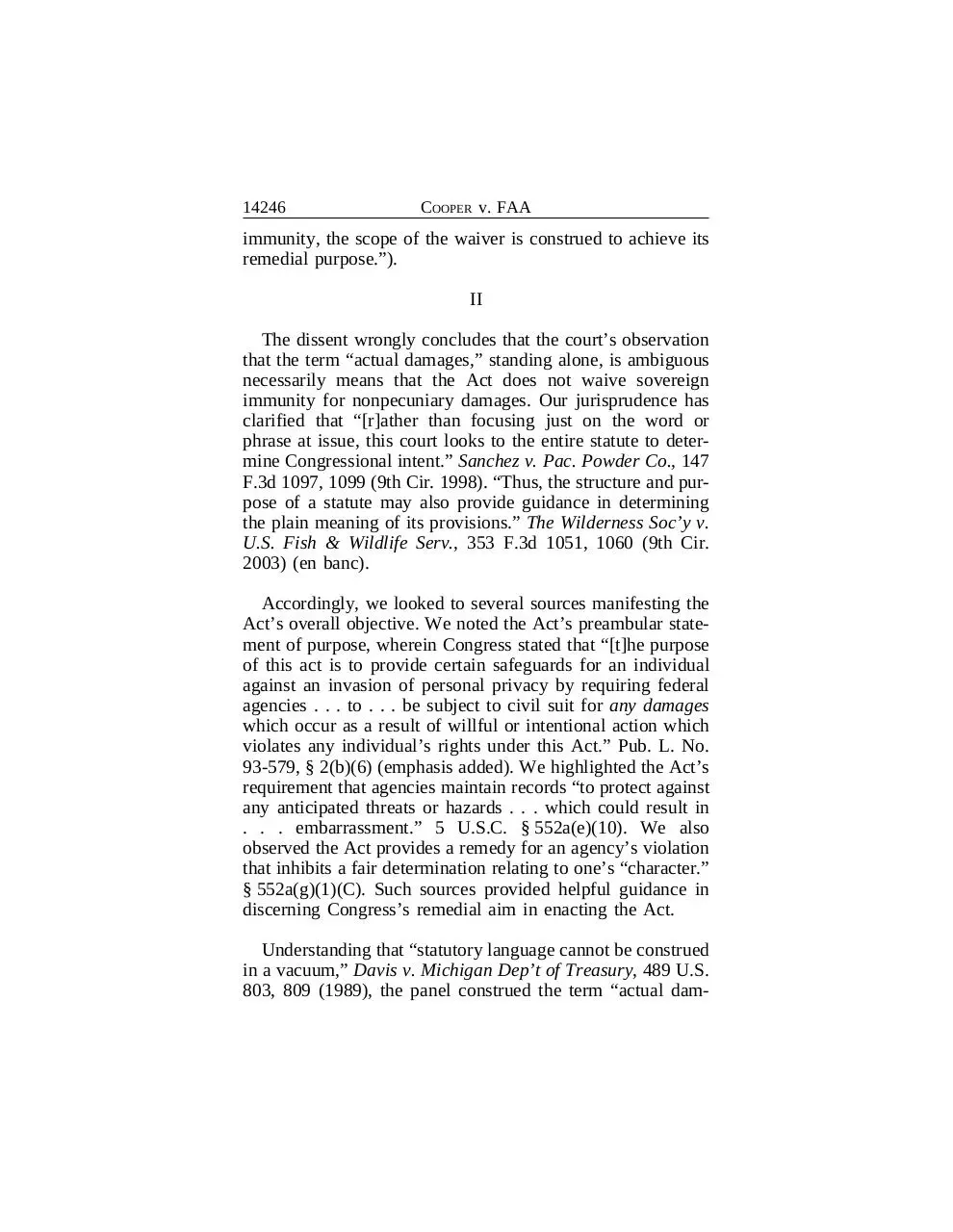CA9 08 17074 1 Amended Opinion (PDF)
File information
This PDF 1.3 document has been generated by , and has been sent on pdf-archive.com on 19/02/2017 at 20:51, from IP address 67.103.x.x.
The current document download page has been viewed 435 times.
File size: 62.29 KB (32 pages).
Privacy: public file





File preview
FOR PUBLICATION
UNITED STATES COURT OF APPEALS
FOR THE NINTH CIRCUIT
STANMORE CAWTHON COOPER,
Plaintiff-Appellant,
v.
FEDERAL AVIATION ADMINISTRATION;
SOCIAL SECURITY ADMINISTRATION;
UNITED STATES DEPARTMENT OF
TRANSPORTATION,
Defendants-Appellees.
No. 08-17074
D.C. No.
3:07-cv-01383VRW
ORDER AND
AMENDED
OPINION
Appeal from the United States District Court
for the Northern District of California
Vaughn R. Walker, Chief District Judge, Presiding
Argued and Submitted
January 13, 2010—San Francisco, California
Filed February 22, 2010
Amended September 16, 2010
Before: Myron H. Bright,* Michael Daly Hawkins, and
Milan D. Smith, Jr., Circuit Judges.
Order;
Concurrence to Order by Judge M. Smith;
Dissent to Order by Judge O’Scannlain;
Opinion by Judge Milan D. Smith, Jr.
*The Honorable Myron H. Bright, Senior United States Circuit Judge
for the Eighth Circuit, sitting by designation.
14239
COOPER v. FAA
14243
COUNSEL
Raymond A. Cardozo, Tiffany Renee Thomas, James M.
Wood, and David J. Bird, Reed Smith LLP, for plaintiffappellant Stanmore Cawthon Cooper.
Michael F. Hertz, Joseph P. Russoniello, Mark B. Stern, and
Samantha Chaifetz, for defendants-appellees, Federal Aviation Administration, Social Security Administration, and
United States Department of Transportation.
ORDER
The opinion filed February 22, 2010, and published at 596
F.3d 538, is hereby amended by deleting footnote 2 (and
renumbering succeeding footnotes) on pages 2825-26 of the
slip opinion (also found at 596 F.3d 538, 543-44).
With this amendment, the panel votes to deny the petition
for panel rehearing. Judge M. Smith votes to deny the petition
for rehearing en banc, and Judges Bright and Hawkins so recommend.
14244
COOPER v. FAA
The full court was advised of the petition for rehearing en
banc. After a request for a vote by an active judge, a vote was
taken, and a majority of the active judges of the court failed
to vote for a rehearing en banc. Fed. R. App. P. 35(f).
The petitions for panel rehearing and rehearing en banc are
DENIED. Further petitions for rehearing and rehearing en
banc shall not be entertained.
M. SMITH, Circuit Judge, concurring in the order denying
rehearing en banc:
I write to respond briefly to the dissent filed with this order.
The Privacy Act (Act) unequivocally waives sovereign
immunity. Under the Act, if a “court determines that [an]
agency acted in a manner which was intentional or willful, the
United States shall be liable to the individual in an amount
equal to the sum of . . . actual damages sustained by the individual as a result of the refusal or failure” to comply with the
Privacy Act. 5 U.S.C. § 552a(g)(4) (emphases added). In light
of that unconditional waiver, we appropriately followed Justice Cardozo’s admonition: “ ‘The exemption of the sovereign
from suit involves hardship enough, where consent has been
withheld. We are not to add to its rigor by refinement of construction, where consent has been announced.’ ” United States
v. Aetna Surety Co., 338 U.S. 366, 383 (1949) (quoting
Anderson v. Hayes Constr. Co., 153 N.E. 28, 29-30 (N.Y.
1926)).
Our dissenting colleague mistakenly asserts that our opinion waives the sovereign immunity of the United States. In
fact, Congress did so. Thus, the issue in this case is not the
existence of a waiver, but rather the scope of that express
waiver, as contemplated in the Act. To that end, we correctly
COOPER v. FAA
14245
construed the waiver to allow the recovery of nonpecuniary
damages, based upon clear congressional intent.
I
The sovereign immunity canon requires that governmental
waivers of sovereign immunity be “unequivocally expressed.”
United States v. Nordic Village, Inc., 503 U.S. 30, 33-34
(1992) (internal quotation marks omitted). The canon has
clearly been satisfied in this case. The Act categorically
waives the federal government’s immunity from suit and
indisputably authorizes the recovery of “actual damages.” The
government’s surrender to liability for damages is in the plain
text of the Act itself, leaving us only to construe the scope of
that surrender.
To construe the scope of this waiver, the panel followed
controlling precedent directing the panel to look to the policies or objectives underlying the Act. See, e.g., Irwin v. Dep’t
of Veterans Affairs, 498 U.S. 89, 95 (1990) (construing the
scope of a wavier of sovereign immunity that reflects “a realistic assessment of legislative intent”); Franchise Tax Bd. of
Cal. v. Postal Serv., 467 U.S. 512, 514-16, 521 (1984) (rejecting the government’s narrow construction of the scope of the
waiver of sovereign immunity under 39 U.S.C. § 401 and
holding that “the scope of such a waiver can only be ascertained by reference to underlying congressional policy”);
Hopi Tribe v. Navajo Tribe, 46 F.3d 908, 921-22 (9th Cir.
1995) (holding that a narrow construction of sovereign immunity under the Navajo-Hopi Settlement Act was improper in
light of “the overriding congressional purpose behind the Settlement Act”); United States v. Oregon, 44 F.3d 758, 766 (9th
Cir. 1994) (“The Supreme Court has repeatedly looked to
indicia of Congressional intent in order to construe the scope
of the unequivocally expressed waiver of immunity in the
McCarran Amendment.”); In re Town & Country Home Nursing Servs., Inc., 963 F.2d 1146, 1151 (9th Cir. 1991) (“It is
well established that when the federal government waives its
14246
COOPER v. FAA
immunity, the scope of the waiver is construed to achieve its
remedial purpose.”).
II
The dissent wrongly concludes that the court’s observation
that the term “actual damages,” standing alone, is ambiguous
necessarily means that the Act does not waive sovereign
immunity for nonpecuniary damages. Our jurisprudence has
clarified that “[r]ather than focusing just on the word or
phrase at issue, this court looks to the entire statute to determine Congressional intent.” Sanchez v. Pac. Powder Co., 147
F.3d 1097, 1099 (9th Cir. 1998). “Thus, the structure and purpose of a statute may also provide guidance in determining
the plain meaning of its provisions.” The Wilderness Soc’y v.
U.S. Fish & Wildlife Serv., 353 F.3d 1051, 1060 (9th Cir.
2003) (en banc).
Accordingly, we looked to several sources manifesting the
Act’s overall objective. We noted the Act’s preambular statement of purpose, wherein Congress stated that “[t]he purpose
of this act is to provide certain safeguards for an individual
against an invasion of personal privacy by requiring federal
agencies . . . to . . . be subject to civil suit for any damages
which occur as a result of willful or intentional action which
violates any individual’s rights under this Act.” Pub. L. No.
93-579, § 2(b)(6) (emphasis added). We highlighted the Act’s
requirement that agencies maintain records “to protect against
any anticipated threats or hazards . . . which could result in
. . . embarrassment.” 5 U.S.C. § 552a(e)(10). We also
observed the Act provides a remedy for an agency’s violation
that inhibits a fair determination relating to one’s “character.”
§ 552a(g)(1)(C). Such sources provided helpful guidance in
discerning Congress’s remedial aim in enacting the Act.
Understanding that “statutory language cannot be construed
in a vacuum,” Davis v. Michigan Dep’t of Treasury, 489 U.S.
803, 809 (1989), the panel construed the term “actual dam-
COOPER v. FAA
14247
ages” in its proper context, see id., to conclude that it
unequivocally encompasses nonpecuniary damages. When a
statute is ambiguous, the doctrine of sovereign immunity is
useful as “a tool for interpreting the law.” Richlin Sec. Serv.
Co. v. Chertoff, 128 S. Ct. 2007, 2019 (2008). When a statute
is not ambiguous, however, “[t]here is no need for us to resort
to the sovereign immunity canon.” Id. Because “there [was]
no ambiguity left for us to construe,” id., the application of
the sovereign immunity canon was unnecessary in this case.
Further, “[t]he sovereign immunity canon is just that—a
canon of construction. It is a tool for interpreting the law, and
we have never held that it displaces the other traditional tools
of statutory construction.” Id.; see also Clark v. Martinez, 543
U.S. 371, 382 (2005) (“The canon is thus a means of giving
effect to congressional intent, not of subverting it.”); Chickasaw Nation v. United States, 534 U.S. 84, 94 (2001) (noting
that “canons are not mandatory rules” but guides “designed to
help judges determine the Legislature’s intent,” and that
“other circumstances evidencing congressional intent can
overcome their force”). Based upon the clear congressional
intent as to the scope of “actual damages” under the Privacy
Act, this court properly concluded that the government could
not “carry the day by invoking general maxims of judicial
policy.” Town & Country, 963 F.2d at 1152.
III
The dissent misconstrues the relationship between the
requirement of showing an “adverse effect” and that of “actual damages.” In Doe v. Chao, the Court held that “an individual subjected to an adverse effect has injury enough to
open the courthouse door.” 540 U.S. 614, 524-25 (2004). A
majority of the circuits in this country, including our own, has
held that mental distress or emotional harm is sufficient to
constitute an adverse effect. See, e.g., Englerius v. Veterans
Admin., 837 F.2d 895, 897 (9th Cir. 1988).
14248
COOPER v. FAA
Under the dissent’s view, a plaintiff is entitled to establish
standing for an injury under the Act that results in a nonpecuniary harm, but is not entitled to seek actual damages for such
a nonpecuniary injury. Such a construction of the Act would
clearly frustrate the intent of Congress. In contrast, our opinion is true to the overall objective of the Act, allowing a plaintiff who demonstrates a nonpecuniary adverse effect to have
the opportunity to recover nonpecuniary damages, to the
extent the plaintiff can proffer the requisite degree of competent evidence that there is a real and tangible nonpecuniary
injury. Our opinion is also consistent with the familiar rule of
statutory construction that remedial legislation should be construed broadly to effectuate its purposes. See, e.g., Clark v.
Capital Credit & Collection Servs, Inc., 460 F.3d 1162, 1176
(9th Cir. 2006) (concluding the remedial nature of the Fair
Debt Collection Practices Act required a liberal construction);
Stewart Title Guar. Co. v. Park, 250 F.3d 124, 1252 (9th Cir.
2001) (“The purpose of the statute is remedial, and, therefore,
should be given a liberal construction[.]”); see also Wilson v.
Libby, 535 F.3d 697, 703 (D.C. Cir. 2008) (characterizing the
Privacy Act as “a comprehensive remedial scheme”).
IV
Controlling precedent in cases such as Franchise Tax
Board, Hopi Tribe, and Town & Country, requires us to construe the scope of the Act’s unequivocal waiver of sovereign
immunity in light of the underlying congressional policy, and
with the purpose of achieving the remedial goal of that
waiver. The multiple sources the panel consulted reveal a
clear and focused intent on the part of Congress to grant complete relief to those injured by willful violations of the Act.
Given that intent, Congress’s provision that the federal government be liable for “actual damages” constitutes an
unequivocal expression of the federal government’s waiver of
its own sovereign immunity for nonpecuniary injuries. The
panel concluded there was no other plausible explanation for
this unqualified language.
COOPER v. FAA
14249
In conclusion, our dissenting colleague reminds us that
“[o]nly Congress has the keys to unlock our country’s Treasury.” Dissent at 14253-54. But Congress used its keys and
opened that door for plaintiffs injured by willful violations of
the Act when it expressly gave plaintiffs the right to sue the
government for actual damages. A court must not act “as a
self-constituted guardian of the Treasury [to] import immunity back into a statute designed to limit it.” Indian Towing
Co. v. United States, 350 U.S. 61, 69 (1955).1
V
The panel’s decision is compelled by the precedents of the
Supreme Court and this court for construing the scope of a
waiver of sovereign immunity, and the court properly denied
rehearing this case en banc.
O’SCANNLAIN, Circuit Judge, dissenting from the order
denying rehearing en banc, joined by KOZINSKI, Chief
Judge, and GOULD, TALLMAN, BYBEE, CALLAHAN,
BEA, and N.R. SMITH, Circuit Judges:
The Supreme Court has consistently held that the sovereign
immunity of the United States may be waived only by an
unequivocal expression in statutory text. Lane v. Pena, 518
U.S. 187, 192 (1996). Today, our court neglects this principle
by leaving in place a decision that the term “actual damages”
in the Privacy Act, 5 U.S.C. § 552a(g)(4)(A), is sufficient to
deem sovereign immunity waived for nonpecuniary damages,
1
Our opinion will not “saddle the Government with disproportionate liability,” Doe, 540 U.S. at 637 (Ginsburg, J., dissenting), as the dissent suggests. Our opinion does not relieve the plaintiff of his burden of producing
evidence sufficient for a jury to find that the emotional harm he claims to
have suffered was tangible and severe enough to give rise to actual damages. It simply gives the plaintiff his day in court so he can present competent evidence of his injury.
14250
COOPER v. FAA
even though the opinion itself admits that the term is not
defined in the statute, has no plain meaning, has no fixed legal
meaning, and indeed, is a “chameleon.” Cooper v. FAA, 596
F.3d 538, 544-45 (9th Cir. 2010). Even more troubling, the
opinion relies on abstract legislative intent and an interpretation of the Privacy Act that the Supreme Court recently
rejected in Doe v. Chao, 540 U.S. 614 (2004). The effect of
today’s order is to open wide the United States Treasury to a
whole new class of claims without warrant. In so doing, we
exacerbate a circuit split that had been healing under the
strong medicine of recent sovereign immunity jurisprudence.1
Hence, it is most unfortunate that we did not rehear this case
en banc.
I
“A waiver of the Federal Government’s sovereign immunity must be unequivocally expressed in statutory text, and
will not be implied. Moreover, a waiver of the Government’s
sovereign immunity will be strictly construed, in terms of its
scope, in favor of the sovereign.” Lane, 518 U.S. at 192
(emphasis added) (internal citations omitted).2 “[T]he
‘unequivocal expression’ of elimination of sovereign immunity that we insist upon is an expression in statutory text.”
1
Compare Hudson v. Reno, 130 F.3d 1193, 1207 & n.11 (6th Cir. 1997)
(holding Privacy Act does not waive sovereign immunity for nonpecuniary damages), and Fanin v. Dep’t of Veterans Affairs, 572 F.3d 868,
872-75 (11th Cir. 2009) (following Fitzpatrick v. IRS, 665 F.2d 327,
329-31 (11th Cir. 1982)) (same), with Johnson v. IRS, 700 F.2d 971,
974-86 (5th Cir. 1983) (holding Privacy Act waives sovereign immunity
for nonpecuniary damages), and Jacobs v. Nat’l Drug Intelligence Ctr.,
548 F.3d 375, 378 (5th Cir. 2008) (reluctantly following Johnson despite
subsequent sovereign immunity jurisprudence).
2
My colleague’s concurrence in the denial of rehearing en banc agrees
that the relevant issue is not the existence of a waiver, but the scope of the
waiver. See Concurrence at 14244. However, since the meaning of the
term “actual damages” is ambiguous, the court should have construed the
waiver narrowly in “favor of the sovereign.” Lane, 518 U.S. at 192.
Download CA9 08-17074-1 Amended Opinion
CA9_08-17074-1_Amended_Opinion.pdf (PDF, 62.29 KB)
Download PDF
Share this file on social networks
Link to this page
Permanent link
Use the permanent link to the download page to share your document on Facebook, Twitter, LinkedIn, or directly with a contact by e-Mail, Messenger, Whatsapp, Line..
Short link
Use the short link to share your document on Twitter or by text message (SMS)
HTML Code
Copy the following HTML code to share your document on a Website or Blog
QR Code to this page

This file has been shared publicly by a user of PDF Archive.
Document ID: 0000557352.